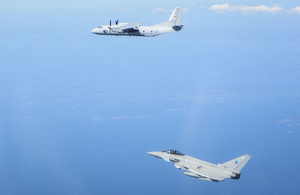RAF Typhoons scrambled twice in two days to intercept Russian military aircraft
Royal Air Force Typhoon fighter jets have intercepted five Russian military aircraft in the last two days; four after launching on Monday and another today.

RAF Typhoon (bottom) deployed on Operation AZOTIZE in Estonia intercepts a Russian military transport aircraft (top)
The Typhoons are operating from Ämari Air Base in Estonia in support of NATO’s Baltic Air Policing mission.
On Monday the fighter jets intercepted a Russian Antonov AN-26 “Curl” transport aircraft. Following this and on the same mission, the fighters later diverted to intercept a Russian TU-142 “Bear” Bomber and two SU-27B “Flanker” fighters.
On Tuesday the Typhoons intercepted a Russian Tupolev TU-134 “Crusty” transport aircraft flying close to Estonian airspace.
Baltic Air Policing is a routine NATO mission for the Typhoons and provides reassurance that the UK is here to work in partnership with Estonia.
A Typhoon pilot from XI(Fighter) Squadron, attached to 121 Expeditionary Air Wing (EAW), was conducting Quick Reaction Alert (QRA) duty when Monday’s scramble was called. He said:
“We were scrambled to intercept a Russian AN-26 aircraft routing west close to Estonian airspace. Once complete with this task, a second task was initiated to intercept a group of contacts operating to the south close to Lithuanian airspace.
“These aircraft transiting the Baltic region were not on a recognised flight plan or communicating with Air Traffic Control. In the end, the intercept was uneventful and conducted in a professional manner throughout.”
The Royal Air Force is deployed on Operation AZOTIZE in Estonia in support of Baltic Air Policing. These were the fifteenth and sixteenth QRA scrambles resulting in intercepts since the RAF took over enhanced Air Policing (eAP) from the German Air Force on 3 May 2019 as part of Baltic Air Policing. The UK operates in support of NATO to reassure our allies and is a further demonstration of the UK’s commitment to the security of the region.